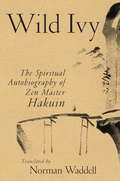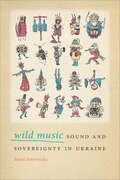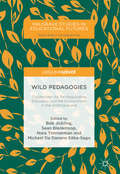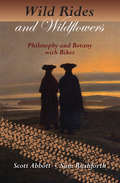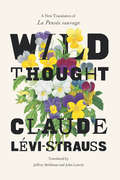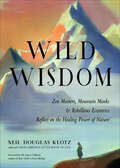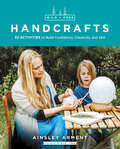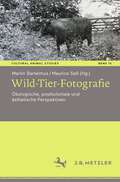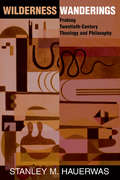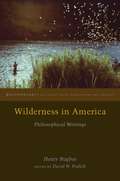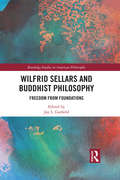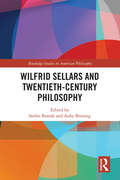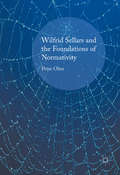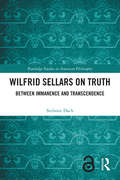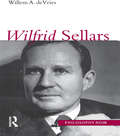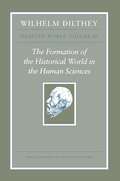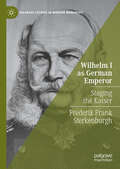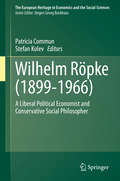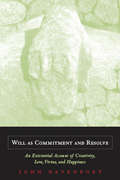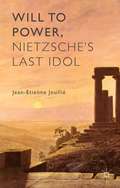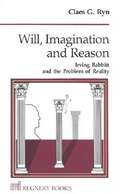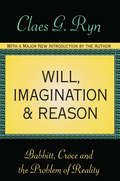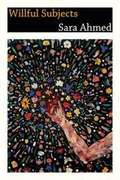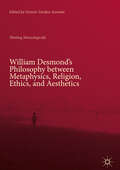- Table View
- List View
Wild Ivy: The Spiritual Autobiography of Zen Master Hakuin
by Norman Waddell Hakuin EkakuA fiery and intensely dynamic Zen teacher and artist, Hakuin (1685-1768) is credited with almost single-handedly revitalizing Japanese Zen after three hundred years of decline. As a teacher, he placed special emphasis on koan practice, inventing many new koans himself, including the famous "What is the sound of one hand clapping?" This English translation of Hakuin's intimate self-portrait includes reminiscences from his childhood, accounts of his Zen practice and enlightenment experiences, as well as practical advice for students.
Wild Music: Sound and Sovereignty in Ukraine (Music / Culture)
by Maria SonevytskyRecipient of the 2020 Lewis Lockwood Award from the American Musicological SocietyWhat are the uses of musical exoticism? In Wild Music, Maria Sonevytsky tracks vernacular Ukrainian discourses of "wildness" as they manifested in popular music during a volatile decade of Ukrainian political history bracketed by two revolutions. From the Eurovision Song Contest to reality TV, from Indigenous radio to the revolution stage, Sonevytsky assesses how these practices exhibit and re-imagine Ukrainian tradition and culture. As the rise of global populism forces us to confront the category of state sovereignty anew, Sonevytsky proposes innovative paradigms for thinking through the creative practices that constitute sovereignty, citizenship, and nationalism.
Wild Pedagogies: Touchstones for Re-Negotiating Education and the Environment in the Anthropocene (Palgrave Studies in Educational Futures)
by Bob Jickling Sean Blenkinsop Nora Timmerman Michael De Danann Sitka-SageThis book explores why the concept of wild pedagogy is an essential aspect of education in these times; a re-negotiated education that acknowledges the necessity of listening to voices in a more than human world, and (re)learning how to dwell in a place. As the geological epoch inexorably shifts to the Anthropocene, the authors argue that learning to live in and engage with the world is increasingly crucial in such times of uncertainty. The editors and contributors examine what wild pedagogy can truly become, and how it can be relevant across disciplinary boundaries: offering six touchstones as working tools to help educators forge an onward path. This collaborative work will be of interest to students and scholars of wild pedagogies, alternative education and the Anthropocene, and for all those engaged in re-wilding education.
Wild Rides and Wildflowers
by Scott Abbott Sam Rushforth"Abbott and Rushforth [have a] knack for entertaining readers."-BOOKLIST"[Wild Rides] becomes about more than riding bikes and admiring nature throughout the four seasons. It also provides an intimate glimpse into the minds and hearts of two men, and the outcome is both surprising and refreshing."--DESERET NEWS"Ride along with Sam and Scott through spectacular landscape and share their vast knowledge of its many plants and creatures and the way their lives-and ours-turn with each new season."-Chip Ward, author of Canaries on the Rim: Living Downwind in the West"It's like Zen and the Art of Motorcycle Maintenance meets Desert Solitaire in Utah County."-Scott Carrier, author of Running After Antelope"Come fall in wonder with nature and humankind as these two scholars and mountain bike enthusiasts explore flora, fauna and the follies of life, love, friendship and aging. Abbott and Rushforth are brash and beautiful, their observations clear-eyed, precise and soulful. By the end of the ride you'll understand more about Utah's landscape and two men's hearts than you ever imagined."-Brooke Adams, former editor of the Salt Lake Observer and Salt Lake Tribune reporter"Sometimes you have to get on the bike and go out with the wild things if you're going to get there at all. Scott Abbott and Sam Rushforth show us the way. Mount up. Here's our ticket to ride."-Charles Bowden, author of Blues for Cannibals"Following the conversations and adventures of Scott and Sam in this work was a delight-my only complaint is that I was stung by an absolute desire to join them. The gusto and passion they have for this land comes through on every page."-Steven L. Peck, author of The Scholar of Moab and A Short Stay in Hell"Imagine Plato's Phaedrus and a field guide to Utah fauna and flora left in an inside pocket of a sweaty, oft-used CamelBak get acquainted and copulate. The wise progeny, scratched and scented, philosophizing its way out, would be Wild Rides and Wildflowers, coauthored by Scott Abbott and Sam Rushforth."-Larry Menlove, for The Provo Canyon Review
Wild Thought: A New Translation of “La Pensée sauvage”
by Claude Lévi-StraussAs the most influential anthropologist of his generation, Claude Lévi-Strauss left a profound mark on the development of twentieth-century thought. Through a mixture of insights gleaned from linguistics, sociology, and ethnology, Lévi-Strauss elaborated his theory of structural unity in culture and became the preeminent representative of structural anthropology. La Pensée sauvage, first published in French in 1962, was his crowning achievement. Ranging over philosophies, historical periods, and human societies, it challenged the prevailing assumption of the superiority of modern Western culture and sought to explain the unity of human intellection. Controversially titled The Savage Mind when it was first published in English in 1966, the original translation nevertheless sparked a fascination with Lévi-Strauss’s work among Anglophone readers. Wild Thought rekindles that spark with a fresh and accessible new translation. Including critical annotations for the contemporary reader, it restores the accuracy and integrity of the book that changed the course of intellectual life in the twentieth century, making it an indispensable addition to any philosophical or anthropological library.
Wild Thought: A New Translation of “La Pensée sauvage”
by Claude Lévi-StraussAs the most influential anthropologist of his generation, Claude Lévi-Strauss left a profound mark on the development of twentieth-century thought. Through a mixture of insights gleaned from linguistics, sociology, and ethnology, Lévi-Strauss elaborated his theory of structural unity in culture and became the preeminent representative of structural anthropology. La Pensée sauvage, first published in French in 1962, was his crowning achievement. Ranging over philosophies, historical periods, and human societies, it challenged the prevailing assumption of the superiority of modern Western culture and sought to explain the unity of human intellection. Controversially titled The Savage Mind when it was first published in English in 1966, the original translation nevertheless sparked a fascination with Lévi-Strauss’s work among Anglophone readers. Wild Thought rekindles that spark with a fresh and accessible new translation. Including critical annotations for the contemporary reader, it restores the accuracy and integrity of the book that changed the course of intellectual life in the twentieth century, making it an indispensable addition to any philosophical or anthropological library.
Wild Wisdom: Zen Masters, Mountain Monks & Rebellious Eccentrics Reflect on the Healing Power of Nature
by Neil Douglas-KlotzInspiration from wilderness mystics from around the world, including Henry David Thoreau, Bai Juyi, Rainer Maria Rilke, Lalla, Rachel Carson, and more.Sages and mystics throughout the centuries have sought inspiration in the wildness of nature. This little book gathers the sayings and stories of the women and men who have sunk their roots deep into inner retreat and brought forth wisdom for all times and peoples.Here we find the stories and voices of desert fathers and mothers, forest hermits, mountain mystics, wandering philosophers, and wise eccentrics who maintained their solitude while living in society and challenged the status quo with humor. From East and West and everything in between. From Christian hermits, wandering Kabbalists, itinerant Sufis, Zen practitioners, Yogis, court jesters, transcendentalists, and freethinkers, Wild Wisdom gathers a timeless harvest for spiritual renewal.By turns witty, startling, beautiful, and sublime, Wild Wisdom makes a fine companion for personal retreat, daily contemplation, or simply taking time out during a busy day.
Wild and Free Handcrafts AFF: 32 Activities to Build Confidence, Creativity, and Skill (Wild and Free)
by Ainsley ArmentThe companion to The Call of the Wild + Free: styled in the lush aesthetic of the Wild + Free brand, a four-color book offering crafts, activities, and essays, that parents, educators, and caregivers can use to inspire their children.Wild + Free Handcrafts is a beautiful, four-color resource book for parents, educators, and caregivers to enjoy doing hands-on activities with kids. A handcraft engages one’s hands, requires a level of learned skill, encourages children to do their best work, and produces an end product that is useful. It has been used in homeschool settings for decades as one way to encourage them to work with their hands and discover a skillful craft they love to practice. It also is a great way for traditionally educated kids who are home for the summer, or in afterschool programs, or with their families on the weekends, to do fun activities that will stimulate their imaginations and creativity. This book will feature crafts such as:Felted acornsPaper beadsNature wreathsCocoa mint lip balmWoven willow hearts Finger knit bracelets Eco-dyed kitchen towels Fairy tale treehouse Flower crowns Bug hotel With the same lush photography as The Call of the Wild + Free, this book includes step-by-step pictures that show parents how to do the craft, and essays on the usefulness and purpose of handcrafts as a tool to spark children’s curiosity and wonder.
Wild-Tier-Fotografie: Ökologische, postkoloniale und ästhetische Perspektiven (Cultural Animal Studies #15)
by Martin Bartelmus Maurice SaßTechnische Innovationen der Fotografie erlaubten Ende des 19. Jahrhunderts, Wildtiere nicht mehr nur als Kadaver und Beute oder in Studio und Gehege abzulichten, sondern ihnen in ihrem natürlichen Habitat nachzuspüren. Die frühe Wildtierfotografie bediente damit ein populäres Interesse an der als lokal, national oder kolonial geschätzten Fauna, lieferte wichtige Beiträge zur zoologischen Forschung und verstand sich häufig als Vorkämpfer des Naturschutzes. Ganz neu stellte sich damit aber auch die Frage, wie man Tiere richtig fotografiert: technisch, ästhetisch, ethisch. Der Band beantwortet diese Fragen in historischer Perspektive und erschließt damit das Forschungsfeld der Wildtierfotografie.
Wilderness Wanderings: Probing Twentieth-century Theology And Philosophy (Radical Traditions Ser.)
by Stanley HauerwasWilderness Wanderings slashes through the tangled undergrowth that Christianity in America has become to clear a space for those for whom theology still matters. Writing to a generation of Christians that finds itself at once comfortably ?at home? yet oddly fettered and irrelevant in America, Stanley Hauerwas challenges contemporary Christians to reimagine what it might mean to ?break back into Christianity? in a world that is at best semi-Christian. While the myth that America is a Christian nation has long been debunked, a more urgent constructive task remains; namely, discerning what it may mean for Christians approaching the threshold of the twenty-first century to be courageous in their convictions. Ironically, reclaiming the church's identity and mission may require relinquishing its purported ?gains??which often amount to little more than a sense of comfort, the seduction of feeling ?at ease in Zion?? to take up again the risk and adventure of life ?on the way.? Accordingly, this book gives no comfort to the religious right or left, which continues to think Christianity can be made compatible with the sentimentalities of democratic liberalism.Such a re-visioned church will not establish itself through conquest or in a reconstituted Christendom, but rather must develop within its own life the patient, attentive skills of a wayfaring people. At least a church seasoned by a peripatetic life stands a better chance of noticing the changing directions of God's leading. The wilderness, therefore, ought not to appear to contemporary Christians in America as a foreboding and frightening possibility but as an opportunity to rediscover the excitement and spirit, but also the rigorous discipline, of faithful itinerancy. At such a crucial time as this, Hauerwas challenges Christians to eschew the insidious dangers that attend too permanent a habitation in a place called America and to assume instead the holy risks and hazards characteristic of people called out, set apart, and led by God. Wilderness Wanderings is a clarion call for Christians to relinquish the impermanent citizenship of a home that can never be the church's final resting place and confidently take up a course of life the horizons of which are as wide and expansive as the God who promises to lead.The book engages, often quite critically, with major theological and philosophical figures, such as Reinhold Niebuhr, Martha Nussbaum, Jeff Stout, Tristram Engelhardt, Iris Murdoch, John Milbank, and Martin Luther King Jr. These interrogations illumine why theology must reclaim its own politics and ethics. Intent on avoiding abstraction, Hauerwas intervenes in current debates around medicine, the culture wars, and race.
Wilderness in America: Philosophical Writings (Groundworks: Ecological Issues in Philosophy and Theology)
by Henry BugbeeThe philosophy of Henry Bugbee defies traditional academic categorization. Though inspired by Heidegger and American Transcendentalism, he was also admired by the famous analytic philosopher Willard van Orman Quine, who described him as the ultimate exemplar of the examined life. Bugbee’s writings are remarkably different in form and register from anything written in twentieth-century American Philosophy. The beautifully written essays collected here show Bugbee’s continuing commitment that “anyone who throws his entire personality into his work must to some extent adopt an aesthetic attitude and medium.” Together, the book reintroduces a major thinker of nature, an environmental philosopher avant la lettre who has much to contribute to American and continental thought.
Wilfrid Sellars and Buddhist Philosophy: Freedom from Foundations (Routledge Studies in American Philosophy)
by Jay L. GarfieldThe aim of this book is to address the relevance of Wilfrid Sellars’ philosophy to understanding topics in Buddhist philosophy. While contemporary scholars of Buddhism often take Sellars as a touchstone for philosophical analysis, and while many take Sellars’ corpus as their entrée into current philosophical discourse, fewer contemporary philosophers have crossed the bridge in the other direction, using Sellarsian ideas as a way of entering into Buddhist philosophy. The essays in this volume, written by both philosophers and Buddhist Studies scholars, are divided into two sections organized around two of Sellars’ essays that have been particularly influential in Buddhist Studies: "Philosophy and the Scientific Image of Man" and "Empiricism and the Philosophy of Mind." The chapters in Part I generally address questions concerning the two truths, while those in Part II concern issues in epistemology and philosophy of mind. The volume will be of interest to Sellars scholars, to scholars interested in the contemporary interaction of Buddhist philosophy and Western philosophy and to scholars of Buddhist Studies.
Wilfrid Sellars and Twentieth-Century Philosophy (Routledge Studies in American Philosophy)
by Stefan Brandt Anke BreunigThis collection features eleven original essays, divided into three thematic sections, which explore the work of Wilfrid Sellars in relation to other twentieth-century thinkers. Section I analyzes Sellars’s thought in light of some of his influential predecessors, specifically Ludwig Wittgenstein, Rudolf Carnap, John Cook Wilson, and Kazimierz Ajdukiewicz. The second group of essays explores from different perspectives Sellars’s place within the analytic tradition, including his relation with analytic Kantianism and analytic pragmatism. The book’s final section extracts some of the most significant lessons Sellars’s work has to offer for contemporary philosophy. These chapters address his views on inference, his views on truth and its connection to recent discussions about truth-relativism and truth-pluralism, his conception of self-knowledge, and his theory of perceptual experience.
Wilfrid Sellars and the Foundations of Normativity
by Peter OlenWhile Wilfrid Sellars' philosophy is often depicted in an ahistorical fashion, this book explores the consequences of placing his work in its historical context. In order to show how Sellars' early publications depend on contextual factors, Peter Olen reconstructs the conceptions of language, psychological, and social explanation that dominated American philosophy in the early 20th century. Because of Sellars' differing explanations of language and behaviour, Olen argues that many of Sellars' early commitments are incompatible with his later works. In the course of doing so, Olen highlights problematic tensions between Sellars' early and later conceptions of language, meta-philosophy, and normativity. Supplementing the main text is a collection of previously unpublished archival material from Wilfrid Sellars, Gustav Bergmann, Everett Hall, and other early 20th century philosophers. This text will be a useful resource to those with an interest in the history of American philosophy, the history of analytic philosophy, Wilfrid Sellars' philosophy, and the myriad issues surrounding normativity and language.
Wilfrid Sellars on Truth: Between Immanence and Transcendence (Routledge Studies in American Philosophy)
by Stefanie DachThis book offers an innovative defense of Wilfrid Sellars’s notion of ideal truth.Sellars adopts two attractive ideas about truth: the pragmatist idea that the concept of truth cannot be understood independently from the norms and practices we find ourselves with and the realist idea that there is one ultimate truth about how the world is. Sellars is thus committed both to an immanent notion of truth and an ideal notion of truth. This book discusses these countervailing tendencies and tries to reconcile them. The author’s defense of Sellars’s notion of truth minimizes problematic commitments while still being recognizably rooted in Sellars’s texts. Additionally, the author defends several innovative claims with respect to Sellars’s thinking, for example, about the relative unimportance of his controversial concept of pictorial adequacy and about the neglected significance of considerations concerning context-sensitive expressions in his thought.Wilfrid Sellars on Truth will be of interest to scholars and advanced students working on Wilfrid Sellars, pragmatism, and questions about truth, naturalism, and scientific realism.Chapters 3, 4, and 6 of this book are freely available as downloadable Open Access PDFs at http://www.taylorfrancis.com under a Creative Commons Attribution-Non Commercial-No Derivatives (CC-BY-NC-ND) 4.0 license.This work was supported by the University of West Bohemia.
Wilfrid Sellars: Reading Wilfrid Sellars' Empiricism And The Philosophy Of Mind, Including The Complete Text Of Sellars' Essay (Philosophy Now)
by Willem A. DeVriesWilfrid Sellars (1912-89) has been called "the most profound and systematic epistemological thinker of the twentieth century" (Robert Brandom). He was in many respects ahead of his time, and many of his innovations have become widely acknowledged, for example, his attack on the "myth of the given", his functionalist treatment of intentional states, his proposal that psychological concepts are like theoretical concepts, and his suggestion that attributions of knowledge locate the knower "in the logical space of reasons". However, while many philosophers have begun to acknowledge Sellars's inspiration in their work, their interpretation of his thought has not always been the most accurate. His writings are difficult. Individually, his essays are complex and sometimes rely on doctrines and arguments he put forward elsewhere. Each of his articles is deepened and strengthened by seeing it in its systematic context, but he never wrote a unified exposition of his system, which therefore has to be pieced together from numerous disparate sources. Willem deVries addresses these difficulties specifically and provides a careful reading and remarkable overview of Sellars's systematic philosophy that will become the standard point of reference for all philosophers seeking to understand Sellars's hugely significant body of work.
Wilhelm Dilthey: The Formation of the Historical World in the Human Sciences
by Wilhelm DiltheyThis volume provides Dilthey's most mature and best formulation of his Critique of Historical Reason. It begins with three "Studies Toward the Foundation of the Human Sciences," in which Dilthey refashions Husserlian concepts to describe the basic structures of consciousness relevant to historical understanding.The volume next presents the major 1910 work The Formation of the Historical World in the Human Sciences. Here Dilthey considers the degree to which carriers of history--individuals, cultures, institutions, and communities--can be articulated as productive systems capable of generating value and meaning and of realizing purposes. Hegel's idea of objective spirit is reconceived in a more empirical form to designate the medium of commonality in which historical beings are immersed. Any universal claims about history need to be framed within the specific productive systems analyzed by the various human sciences. Dilthey's drafts for the Continuation of the Formation contain extensive discussions of the categories most important for our knowledge of historical life: meaning, value, purpose, time, and development. He also examines the contributions of autobiography to historical understanding and of biography to scientific history.The finest summary of Dilthey's views on hermeneutics can be found in "The Understanding of Other Persons and Their Manifestations of Life." Here, Dilthey differentiates understanding relative to three kinds of manifestations of life. After giving his analysis of elementary understanding, he examines the role of induction in higher understanding and interpretation, and the relevance of transposition and re-experiencing for grasping individuality.
Wilhelm I as German Emperor: Staging the Kaiser (Palgrave Studies in Modern Monarchy)
by Frederik Frank SterkenburghThis book offers the first-ever scholarly study of Wilhelm I as Germany’s first Kaiser. For decades, Wilhelm has been dismissed by historians as a political nullity and an unwilling imperial figurehead, who was perpetually overruled by chancellor Otto von Bismarck. As a result, scholars concluded that the imperial role did not reach maturity until the accession of Wilhelm II. This book challenges this assumption by analysing how Wilhelm used self-staging to effectuate his role as German emperor and set the precedent for his successors, Friedrich III and Wilhelm II. It explores how he oversaw and intervened in the political and military decision-making processes, his use of politics of history, his understanding and practicing of the imperial role towards other German states and dynasties, his self-presentation in the new German capital, and how his public persona was distorted in German cultural memory after his death in 1888. The book draws on a wealth of previously unexplored sources, including material from Wilhelm’s personal archive, the archives of the Hohenzollern monarchy, the Prussian state, and local archives. It offers a much-needed reassessment of Wilhelm I and makes an important contribution to debates on the role of the Kaiser in German politics, the political system, and culture of the early German nation state, and how the Hohenzollern monarchy adapted to the demands of generating popular support for its new German imperial role.
Wilhelm Röpke (1899–1966)
by Patricia Commun Stefan KolevThis volume provides a comprehensive account of Wilhelm Röpke as a liberal political economist and social philosopher. Wilhelm Röpke (1899-1966) was a key protagonist of transatlantic neoliberalism, a prominent public intellectual and a gifted international networker. As an original thinker, he always positioned himself at the interface between political economy and social philosophy, as well as between liberalism and conservatism. Röpke’s endeavors to combine these elements into a coherent whole, as well as his embeddedness in European and American intellectual networks of liberal and conservative thinkers, are a central theme throughout the book. The volume includes papers by international experts from a conference in Geneva on the occasion of the 50th anniversary of Röpke’s passing. The first part focuses on new biographical insights into his exile years in Istanbul and Geneva, while the second part discusses his business cycle theory in the context of the Great Depression, and the third part elaborates on his multifaceted social philosophy.Wilhelm Röpke was among the most important thinkers within the classical liberal revival post-WWII, with intriguing tensions between liberalism and conservatism. A highly recommended volume.–– Peter J. Boettke, 2016-2018 President of the Mont Pèlerin Society and Professor of Economics and Philosophy, George Mason University This important collection of papers provides an in-depth assessment of Wilhelm Röpke’s contributions, placing him in the context of his time. A fine contribution. –– Bruce J. Caldwell, Director of the Center for the History of Political Economy and Research Professor of Economics, Duke University
Will as Commitment and Resolve: An Existential Account of Creativity, Love, Virtue, and Happiness
by John J. DavenportIn contemporary philosophy, the will is often regarded as a sheer philosophical fiction. In Will as Commitment and Resolve, Davenport argues not only that the will is the central power of human agency that makes decisions and forms intentions but also that it includes the capacity to generate new motivation different in structure from prepurposive desires. The concept of "projective motivation" is the central innovation in Davenport's existential account of the everyday notion of striving will. Beginning with the contrast between "eastern" and "western" attitudes toward assertive willing, Davenport traces the lineage of the idea of projective motivation from NeoPlatonic and Christian conceptions of divine motivation to Scotus, Kant, Marx, Arendt, and Levinas. Rich with historical detail, this book includes an extended examination of Platonic and Aristotelian eudaimonist theories of human motivation. Drawing on contemporary critiques of egoism, Davenport argues that happiness is primarily a byproduct of activities and pursuits aimed at other agent-transcending goods for their own sake. In particular, the motives in virtues and in the practices as defined by Alasdair MacIntyre are projective rather than eudaimonist. This theory is supported by analyses of radical evil, accounts of intrinsic motivation in existential psychology, and contemporary theories of identity-forming commitment in analytic moral psychology. Following Viktor Frankl, Joseph Raz, and others, Davenport argues that Harry Frankfurt's conception of caring requires objective values worth caring about, which serve as rational grounds for projecting new final ends. The argument concludes with a taxonomy of values or goods, devotion to which can make life meaningful for us.
Will to Power, Nietzsche’s Last Idol
by Jean-Etienne JoulliéThe book proposes a critique of Nietzsche's works 'from within'. In doing so, it answers the continuing question asked by any reader of Nietzsche: Why did he decide not to write the major work he said he would write?
Will, Imagination and Reason: Irving Babbitt and the Problem of Reality
by Claes G. RynRyn provides a thorough examination of the ideas of Irving Babbitt, leader of the New Humanism movement in the 1920s and 1930s.
Will, Imagination, and Reason: Babbitt, Croce and the Problem of Reality
by Claes G. RynWill, Imagination, and Reason sets forth a new understanding of reality and knowledge with far-reaching implications for the study of man and society. Employing a systematic approach, Claes Ryn goes to the philosophical depths to rethink and reconstitute the epistemology of the humanities and social sciences. He shows that will and imagination, together, constitute our basic outlook on life and that reason derives its material and general orientation from the interaction between them.The imaginative master-minds novelists, poets, composers, painters, and others powerfully affect the sensibility and direction of society. Sometimes a distorting, self-serving willfulness at the base of their visions draws civilization, including reason, into dangerous illusion. More penetrating and balanced vision and rationality spring from a different quality of will. Ryn explains the kind of interplay between will, imagination, and reason that is conducive to a deepened sense of reality and to intellectual understanding. He argues that human life and self-knowledge are inescapably historical. In developing his dialectical view of intellect, he draws from Irving Babbitt, Benedetto Croce, and other philosophers to refute positivistic, formalistic, and ahistorical theories of knowledge and to develop his alternative.Advancing a systematic epistemological argument, Ryn throws much new light on the nature of reason but also on central issues of ethics and aesthetics. This trenchant and original work is indispensable to philosophers, social, political and cultural theorists, literary scholars, and historians.
Willful Subjects
by Sara AhmedIn Willful Subjects Sara Ahmed explores willfulness as a charge often made by some against others. One history of will is a history of attempts to eliminate willfulness from the will. Delving into philosophical and literary texts, Ahmed examines the relation between will and willfulness, ill will and good will, and the particular will and general will. Her reflections shed light on how will is embedded in a political and cultural landscape, how it is embodied, and how will and willfulness are socially mediated. Attentive to the wayward, the wandering, and the deviant, Ahmed considers how willfulness is taken up by those who have received its charge. Grounded in feminist, queer, and antiracist politics, her sui generis analysis of the willful subject, the figure who wills wrongly or wills too much, suggests that willfulness might be required to recover from the attempt at its elimination.
William Desmond’s Philosophy between Metaphysics, Religion, Ethics, and Aesthetics: Thinking Metaxologically
by Dennis Vanden AuweeleThis volume collects seventeen new essays by well-established and junior scholars on the philosophical relevance of metaxological philosophy and its main proponent, William Desmond. The volume mines metaxological thought for its salience in contemporary discussions in Continental philosophy, specifically in the fields of metaphysics, philosophy of religion, ethics, and aesthetics. Among others, topics under discussion include the goodness of being, the existence and nature of God, and the aesthetic dimensions of human becoming. Interest in metaxological philosophy has been on the rise in recent years, and this volume provides both a practical introduction and thorough engagements with it by experts in the field. The volume concludes with a series of responses by William Desmond on the issues raised by the contributors.
